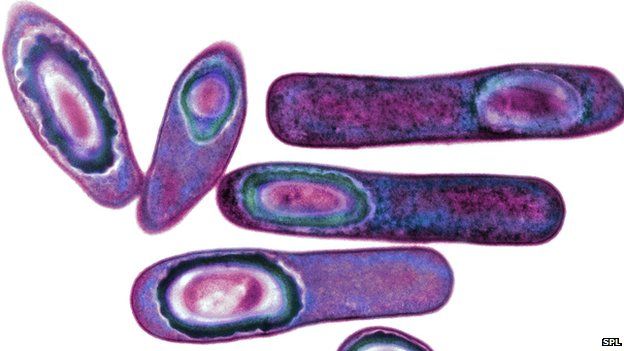C. diff used to beat C. diff infection
- Published

Potentially deadly Clostridium difficile infections have been treated with a dose of... more C. difficile.
The "fight-fire-with-fire" approach by US doctors replaced aggressive versions of the bug with their friendlier cousins.
Trials on 173 people, published in the Journal of the American Medical Association, showed the odds of repeat infection were cut dramatically.
Experts said it was a promising start and an interesting idea.
C. difficile infections cause diarrhoea and fever.
They have been a major problem in hospitals around the world, with around 29,000 deaths in the US alone linked to the bug each year.
The bacteria are able to take over the gut when a course of antibiotics kills off the bugs that normally live there.
The treatment is yet more antibiotics, but this puts some people into a vicious cycle as the drugs leave the gut vulnerable once again.
Bug wars
The symptoms are caused by toxins released by C. difficile bacteria.
So the team at Loyola University Health System in Illinois tried giving patients spores of non-toxin-producing C. difficile.
The friendlier bacteria should occupy the spaces in the gut that the toxic C. difficile normally inhabits and prevent it coming back.
The trial showed the healthier bacteria took hold in the gut 69% of the time. In those people, just one in fifty faced another infection.
Meanwhile, one in three people had renewed symptoms if the bacteria failed to colonise the gut or if they were given a dummy treatment.
Dr Dale Gerding, one of the researchers at Loyola University Health System, told the BBC: "C. difficile infections are the most common hospital-acquired infection that we have - it is a big problem.
"What we're doing is establishing competition with the original, toxic strain.
"I'm excited about this and looking forward to a phase-three [larger] trial. We think it'll go a long way to reduce C. diff recurrence."
Their ambition is to also give the spores to people who are about to go on a course of antibiotics so they never become ill from C. diff.
Better than poo?
A similar technique for treating stubborn C. diff infections that has been gaining popularity is a faecal transplant.
Healthy gut bugs are taken from a relative's stool and given to the patients.
Dr Simon Clarke, from the University of Reading, told the BBC: "It is an interesting idea. It is a less grim version of a faecal transplant and a very interesting concept to block infection.
"They are still infected with bacteria, but they are a more friendly version.
"This paper established the proof of principle, but what they need to do is find out exactly how you can use it."
The study was funded by ViroPharma Incorporated, which is now part of the biotech firm Shire.